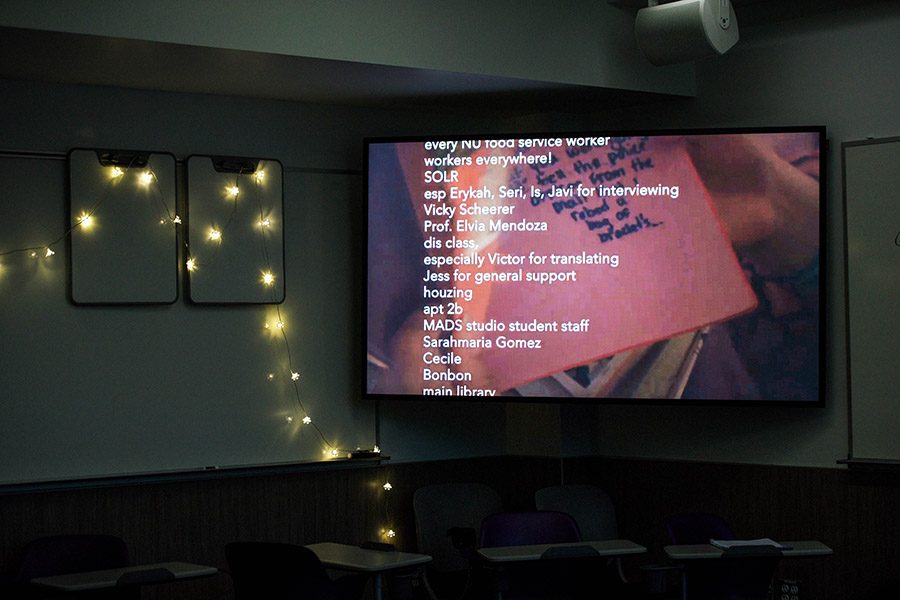Student groups hold International Workers’ Day events, stand in solidarity with service, graduate workers
Cameron Cook/Daily Senior Staffer
Students Organizing for Labor Rights shows a film during an International Workers’ Day Event on Wednesday. SOLR and Northwestern Graduate Workers recognized the holiday, which commemorates gains made by labor movements all over the world.
May 1, 2019
Northwestern student groups held events Wednesday to celebrate International Workers’ Day, a holiday that commemorates gains made by labor movements all over the world.
International Workers’ Day — sometimes called Workers’ Day or May Day — has its roots in a Federation of Organized Trades and Labor Unions convention that took place May 1, 1884 in Chicago, during which organizers called for an eight hour work day and an end to inhumane working conditions. Two years later, in 1886, hundreds of thousands of workers participated in a May 1 strike, beginning the tradition of a May Day rally.
Northwestern University Graduate Workers, the University’s graduate student union, held its Spring Quarter general meeting on International Workers’ Day because of the holiday’s historical significance.
Third-year philosophy graduate student Eli Lichtenstein on Wednesday gave a brief history of May Day organizing and emphasized how more militant organizing produces results.
“Only by returning to these more drastic measures can we actually advance the labor agenda,” Lichtenstein said, citing recent walkouts at colleges and universities, as well as strikes by other non-union employees in different industries across the country.
Lichtenstein added that NUGW was recognizing May Day even though it’s not a federal holiday — the United States traditionally celebrates Labor Day in September. By separating Labor Day from May Day, he said, the U.S. government separated the public’s understanding of labor from the labor movement’s “militant history.”
NUGW usually meets on Wednesdays, but the choice to schedule a general meeting on May Day was an intentional one, said first-year philosophy graduate student Mauricio Maluff Masi, because of the day’s significance in Chicago’s history.
“We see ourselves as being part of the history of labor struggle,” he said.
Another reason the meeting was Wednesday, said fifth-year math graduate student Kitty Yang, was so the group could stand in solidarity with other Chicago-area graduate students rallying in the city.
[NUGW is pushing for guaranteed sixth year research funding. Read more here.]
Students Organizing for Labor Rights, a group working toward improving conditions for service workers, also met on Wednesday, and showed documentary films and made cards for Northwestern service workers. The students decided to hold the event on International Workers’ Day to draw attention to the issue of workers’ rights beyond Northwestern, said SESP junior Gabriella Johansson, a SOLR member.
“We’re trying to build more of a campus consciousness,” she said. “This is not a problem that we care about here, and then when we leave, something we won’t continue working toward.’
SOLR members created a card for the staff of each dining establishment on campus, including dining halls and retail establishments like Kresge Cafe. Weinberg junior Isabella Ko introduced the films and made a list of the establishments for which the group would make cards.
“We wanted to make this a night of not only watching these films, but also making cards for all the workers in these respective places,” Ko told the group of students.
The students watched two short films, one of which followed the story of a current Northwestern Dining employee. Johansson said the group picked the films to in part to highlight women’s roles in labor movements — both locally and across the country.
“Working for workers’ rights and for the humanity of the people around us is way bigger than this school, and way bigger than us as an organization,” Johansson said. “Because of the capitalist society that we live in, this struggle is connected to communities all over the world.”
Email: [email protected]
Twitter: @cam_e_cook


